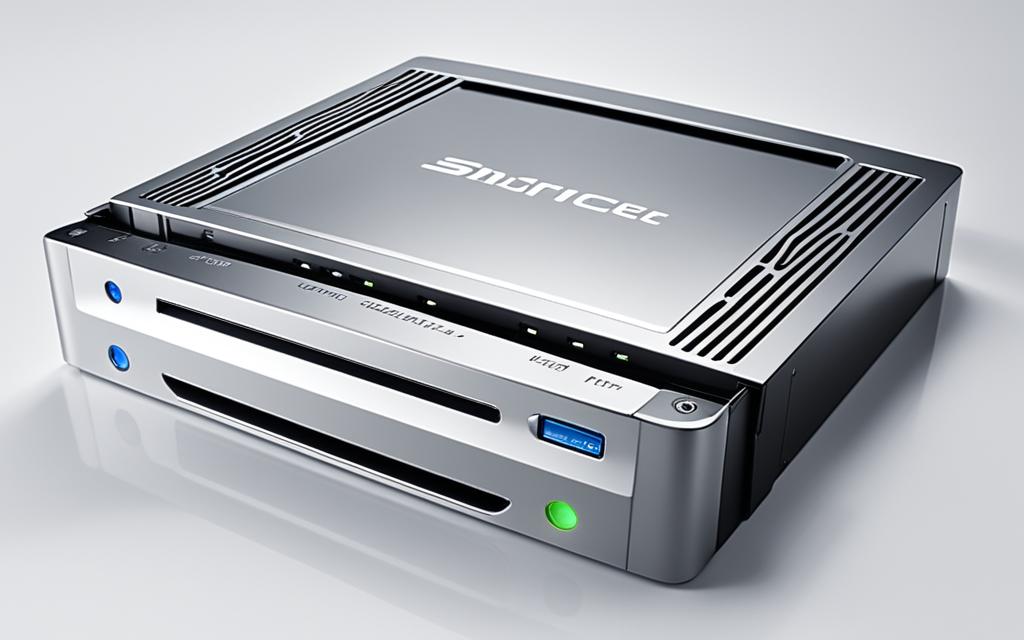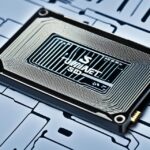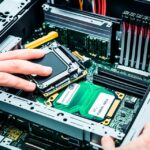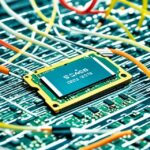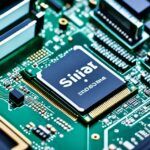Table of Contents
Many people wonder if Solid-State Drives (SSDs) are a type of magnetic storage. The answer is quite simple. SSDs are not magnetic storage devices. They use flash memory to store data. Unlike Hard Disk Drives (HDDs), which work with spinning disks and magnets, SSDs operate with no moving parts. This makes SSDs faster and more reliable than traditional HDDs. We’re here to clear up any confusion and shed light on what makes SSDs stand out in the world of technology.
Key Takeaways
- SSDs utilise flash memory rather than magnetic platters.
- Solid-state drives offer superior speed and reliability over magnetic storage.
- Understanding the differences is crucial for informed storage decisions.
- SSDs are revolutionising data storage technology in both consumer and enterprise markets.
- Debunking misconceptions about storage types leads to better technology adoption.
Understanding Storage Technologies
Data storage technology is changing fast, offering different ways for users to handle information. It’s key to know how storage devices work and their role in today’s computers.
Types of Storage Devices
Types of storage devices include Hard Disk Drives (HDDs), Solid-State Drives (SSDs), and optical and magneto-optical drives. HDDs store data on spinning disks through magnetism, known for their large storage space. SSDs use flash memory, making them faster and more reliable, with speeds much quicker than HDDs. Optical drives read and write data using lasers. Magneto-optical drives mix magnetic and optical tech. Choosing the right data storage solutions is vital as the need for efficient data handling increases.
Importance of Data Storage in Modern Computing
The role of data storage in modern computing is huge. It is the backbone for decisions in companies and improves the experience in various apps. As data creation grows, managing and safeguarding it is crucial for both companies and personal use. The right storage tech must balance speed, size, and reliability to make systems and apps run well. Good data management boosts productivity and leads to technology progress.
| Storage Device | Read/Write Speed | Advantages | Disadvantages |
|---|---|---|---|
| HDD | 30-150 MBps | Cost-effective, high capacity | Slower, mechanical parts |
| SSD | 500 MBps to 3,500 MBps | Faster, no moving parts, more reliable | Higher cost, limited write cycles |
| Optical Drives | Varies | Portable, good for media | Slower, limited capacity |
| Magneto-Optical Drives | Varies | Durable, mixture of technologies | Outdated, not very common |
With so many types of storage devices, knowing what each offers helps choose the best data storage options456.
What is Magnetic Storage?
Magnetic storage is key in storing data, using HDD technology for reliable recording and retrieval. Exploring how magnetic drives function shows the intricate beauty of this tech.
How Magnetic Drives Work
Magnetic drives work by spinning platters that are covered in a magnetic substance. Data gets recorded when an actuator arm changes the platters’ magnetic directions. This process is efficient but mechanical, hence the familiar sound of hard drives working. Most computers now have magnetic drives that store at least 1 TB. Drives holding 4 TB are more common6. This large storage is quite affordable, costing only a few pennies per gigabyte2.
Advantages and Disadvantages of Magnetic Storage
Magnetic storage has its benefits, such as low cost and large capacity. These features meet the needs of many users. However, they can fail mechanically due to their moving parts. They are also prone to damage from magnets. SSDs offer quicker data access but are much pricier than magnetic drives2. Considering the pros and cons of HDDs is vital for making the right choice.
| Feature | Magnetic Storage | Solid-State Drives (SSD) |
|---|---|---|
| Typical Capacity | 1 TB and above | 256 GB – 512 GB |
| Cost per GB | Cents | Higher than magnetic storage |
| Read/Write Speed | Relatively Quick | Very Fast |
| Moving Parts | Yes | No |
| Lifespan | Limited by moving parts | Longer, but limited by flash cell writes |
As magnetic storage stays relevant, SSDs present new paths for the future of storing data. The strength and weaknesses of magnetic storage drive forward the advancement in storage tech6.
What is an SSD?
Solid-State Drives (SSDs) have changed how we store data today. Unlike the older Hard Disk Drives (HDDs), they don’t use moving parts. Instead, they work with flash memory to access data fast. This makes SSDs much quicker and uses less power. They are now a top choice for computers.
Technology Behind Solid-State Drives
SSDs keep data safe even when they’re off, thanks to non-volatile flash memory. They are made of many NAND flash memory chips. This setup allows for very quick data access and storing. For example, SSDs can go from accessing data in 0.013 ms to much less. Their read and write speeds have also shot up drastically7.
Why SSDs are Gaining Popularity
More and more people are choosing SSDs for their speed and shorter boot-up times. As SSD technology gets better, prices drop, making them more popular. They are more reliable than HDDs because they don’t have mechanical parts. This means they’re less likely to break.
SSDs are lighter and save more battery. This makes them perfect for laptops and portable devices.
Advances in flash memory technology and lower costs are making SSDs more common. They offer better performance and reliability. Both companies and regular users see the benefits of speedy input/output operations. This is changing how we store data.
When getting rid of SSDs, special steps are needed to keep data safe. Standard deletion methods don’t work well. It’s best to use tools like the Crunch 250 Hard Drive Destroyer for this8.
The potential and benefits of SSDs are clear. They are becoming key in data storage for the future.
Is SSD Magnetic Storage?
Are SSDs considered magnetic storage? This question can be answered by looking into how they work. SSDs and HDDs both store data, but in different ways. HDDs use magnetic storage, working with spinning platters. These platters can be damaged by physical shocks and take longer to access data. SSDs, however, use solid-state technology with flash memory chips. They have no moving parts. Moving from magnetic to solid-state means big changes in performance, durability, and how much power they use.
Differences Between SSDs and Hard Disk Drives (HDDs)
Looking at SSDs versus HDDs, there are key differences. SSDs have faster speeds, reaching over 200MBs to 550MBs. HDDs are slower, between 50-120MBs. SSDs also start up quicker, taking about 10-13 seconds. HDDs, on the other hand, take 30-40 seconds. Additionally, SSDs are more power-efficient.
They use only 2-3 watts, while HDDs use 6-7 watts. SSDs are also more durable and quiet. They’re less likely to be damaged and don’t make noise like HDDs do. Over time, SSDs tend to last longer, too. With these advantages, SSDs are often the preferred choice for modern data storage912.
Performance Comparison: SSDs vs Magnetic Drives
In the world of keeping data, knowing the difference between SSDs and old magnetic drives matters a lot. The big gap in speed and how well they work is why many are switching to SSDs. We’ll look into how fast data moves, especially how SSDs do compared to HDDs. We’ll also talk about how much energy they use and managing heat.
Speed and Data Transfer Rates
SSDs are way faster than HDDs. For sure, SSDs can be up to a hundred times quicker, boosting how well your computer works10. For instance, NVMe SSDs can move data up to 4GB every second with the help of PCIe lanes. This is much faster than HDDs that move data at a speed of 30–150 MB/s11.
SATA 3.0 SSDs can transfer about 600MB/s, a big jump from HDDs11. In tests, Flash SSDs are better than HDDs, scoring 1075 IOPs for small data moves against 175 IOPs for HDDs12.
Energy Consumption and Heat Management
Another important factor is how much power they use. SSDs need less power, mostly because they don’t have moving parts. This means they don’t get as hot, which helps in keeping them cool10. On the other hand, HDDs have parts that move. This uses more energy and makes more heat, often needing better cooling12.
As people want more energy-saving storage, knowing about SSDs and HDDs’ power use becomes key for tech fans and experts.
| Specification | SSDs | HDDs |
|---|---|---|
| Maximum Speed | 4GB/s (NVMe) | 150MB/s |
| IOPS (Small Reads) | 1075 IOPs | 175 IOPs |
| Energy Consumption | Lower | Higher |
| Heat Generation | Lower | Higher |
Looking at SSD performance against HDD performance shows us how new tech is changing how we manage data111210.
Durability and Reliability of SSDs
Solid-State Drives (SSDs) shine in durability because they lack moving parts. This makes SSDs more reliable for all kinds of computing tasks. Unlike traditional drives that can fail mechanically, SSDs stand up well to bumps and shakes. This means your data stays safe even when devices are used on the go or in tough spots.
No Moving Parts Compared to Magnetic Drives
SSDs also have a longer life and work better than old-school drives. They typically last about 1.5 million hours before any troubles. The number of times data can be written and erased varies by the SSD’s tech, with numbers from 500 to 100,00013. Adding 3D NAND tech means more data can be stored and accessed swiftly, though it may push up costs. These improvements show why SSDs are top-notch for keeping data today.
Data Recovery Challenges
However, fixing lost data on SSDs can be tricky. They use complex ways and wear-leveling tricks that can make it hard to get back lost or damaged data. Even though these methods help keep data safe, they can make recovery tough. Specialists in data recovery are often needed to handle these tricky situations. The widgets that keep SSDs running well might also increase the risk of losing data for good, making it harder to get back14.
Keeping several copies of data is key for avoiding loss. Make sure to do backups often. Checking that your data is okay from time to time helps avoid unpleasant surprises15. Knowing how your SSD works is important to protect important files.
| SSD Model | TBW (Terabytes Written) | P/E Cycles | MTBF (Mean Time Between Failors) |
|---|---|---|---|
| Samsung 870 EVO (250GB) | 150TBW | 500 – 100,000 | 1.5 million hours |
| Samsung 870 EVO (500GB) | 300TBW | 500 – 100,000 | 1.5 million hours |
| Samsung 870 EVO (1TB) | 600TBW | 500 – 100,000 | 1.5 million hours |
| Samsung 870 EVO (2TB) | 1,200TBW | 500 – 100,000 | 1.5 million hours |
| Samsung 870 EVO (4TB) | 2,400TBW | 500 – 100,000 | 1.5 million hours |
This table gives a clear view of some well-known SSDs, showing how their toughness and performance line up131415.
Conclusion
The discussion around storage tech keeps evolving. Clearly, SSDs and HDDs play different roles in managing data. SSDs use flash memory for better performance and longer life than HDDs. They are 25 to 100 times quicker than HDDs. This makes systems more reliable and efficient16.
People are moving away from old magnetic storage. SSDs are faster and protect data better against magnetic issues. They are a top choice for those wanting devices that last long and manage heat well17.
SSDs are changing how we store and get to our data. Knowing about this helps us make smart choices. As the world gets more digital, using newer tech like SSDs is key. They’re not just new hardware; they pave the way for a better digital storage future.
FAQ
Is an SSD a type of magnetic storage?
No, SSDs (Solid-State Drives) aren’t magnetic. They use flash memory technology. Unlike HDDs, they don’t have any mechanical parts. Hard Disk Drives rely on magnetic storage.
What are the main types of storage devices?
Storage devices come in several types. Hard Disk Drives (HDDs), Solid-State Drives (SSDs), and optical drives, like CDs and DVDs, are a few examples. There are also magneto-optical drives. Each has its own way of storing data.
Why is effective data storage important in modern computing?
Good data storage is key for making decisions and staying productive. It keeps computer systems running smoothly. With more and more data being created, choosing the right storage is vital for good performance and reliability.
How do magnetic drives work?
Magnetic drives store data on metal platters using magnetism. An actuator arm changes the magnetic orientation to read and write data. This process creates mechanical movements and sometimes noise.
What are the advantages of magnetic storage?
Magnetic storage offers large amounts of space at a low cost. It can store over 1 TB and has good file retrieval performance. But, it can fail mechanically and be affected by magnets.
What sets SSDs apart from HDDs in terms of technology?
Unlike HDDs, SSDs have no moving parts. They use NAND flash memory for quick data access. This makes SSDs faster and more reliable than HDDs, which depend on mechanical parts.
Why are SSDs becoming more popular among users?
SSDs are faster and more reliable. They also cost less now. They improve boot times and system response, making them better for many uses. This is why they’re becoming a top choice.
What are the differences in performance between SSDs and HDDs?
SSDs are much quicker, with speeds from 500 MB/s to 3,500 MB/s. HDDs, however, range only from 30–150 MB/s. SSDs are the preferred choice for tasks that need speed.
How do SSDs manage energy consumption compared to HDDs?
SSDs use less power because they have no moving parts. This means they produce less heat. HDDs use more power and get hotter, which often means they need fans to cool down.
What are the durability advantages of SSDs over HDDs?
SSDs are tough and last longer. They’re not easily damaged by bumps or drops. This makes them perfect for carrying around. They’re a safer place to keep your data for a long time.
Are there data recovery challenges associated with SSDs?
Yes, recovering data from an SSD can be hard. SSDs use special methods to store data, which can sometimes cause lost data to be overwritten. This makes it tricky to get back lost information.
Source Links
- https://datarecovery.com/rd/whats-the-difference-between-optical-magnetic-and-solid-state-data-storage/ – What’s the Difference Between Optical, Magnetic, and Solid-State Data Storage? – Datarecovery.com
- https://learnlearn.uk/igcsecs/magnetic-optical-solid-state-storage/ – Magnetic, Optical & Solid State Storage | IGCSE Computer Science | Learnlearn.uk
- https://www.ibm.com/think/topics/hard-disk-drive-vs-solid-state-drive – Hard Disk Drive (HDD) vs. Solid State Drive (SSD) | IBM
- https://www.techtarget.com/searchstorage/definition/SSD-solid-state-drive – What is an SSD (Solid-State Drive)?
- https://aws.amazon.com/compare/the-difference-between-ssd-hard-drive/ – SSD vs HDD – Difference Between Data Storage Devices – AWS
- https://www.nuagerie.com/help/article/1407/The-Difference-between-SSD-and-Magnetic-Storage-Drives – The Difference between SSD and Magnetic Storage Drives | Nuagerie
- https://en.wikipedia.org/wiki/Solid-state_drive – Solid-state drive
- https://www.geeksforgeeks.org/difference-between-hard-disk-drive-hdd-and-solid-state-drive-ssd/ – Difference between Hard Disk Drive (HDD) and Solid State Drive (SSD) – GeeksforGeeks
- https://www.werecoverdata.com/blog/solid-state-drives-vs-magnetic-spinning-drives-different – Solid State Drives VS. Magnetic Spinning Drives: How are they Different?
- https://www.kingston.com/en/blog/pc-performance/benefits-of-ssd – The 5 Benefits of SSDs over Hard Drives- Kingston Technology
- https://www.promax.com/blog/nvme-vs-ssd-speed-storage-mistakes-to-avoid – NVMe vs SSD: Speed, Storage & Mistakes to Avoid – Updated 2023
- https://www.diffen.com/difference/HDD_vs_SSD – HDD vs SSD – Difference and Comparison
- https://www.backblaze.com/blog/how-reliable-are-ssds/ – Are Solid State Drives / SSDs More Reliable Than HDDs?
- https://nisus.com/forum/viewtopic.php?t=12116 – Reliability of SSDs & other types of storage
- https://www.avast.com/c-ssd-vs-hdd – SSD vs. HDD: Which Do You Need?
- https://uwaterloo.ca/arts-computing-newsletter/winter-2018/feature/everything-you-need-know-about-solid-state-drives-ssd – Everything you need to know about solid-state drives (SSD) | Arts Computing Office Newsletter
- https://computercity.com/hardware/storage/are-ssds-affected-by-magnets-and-debunking-other-common-myths – Are SSDs Affected by Magnets? And Debunking Other Common Myths – ComputerCity

